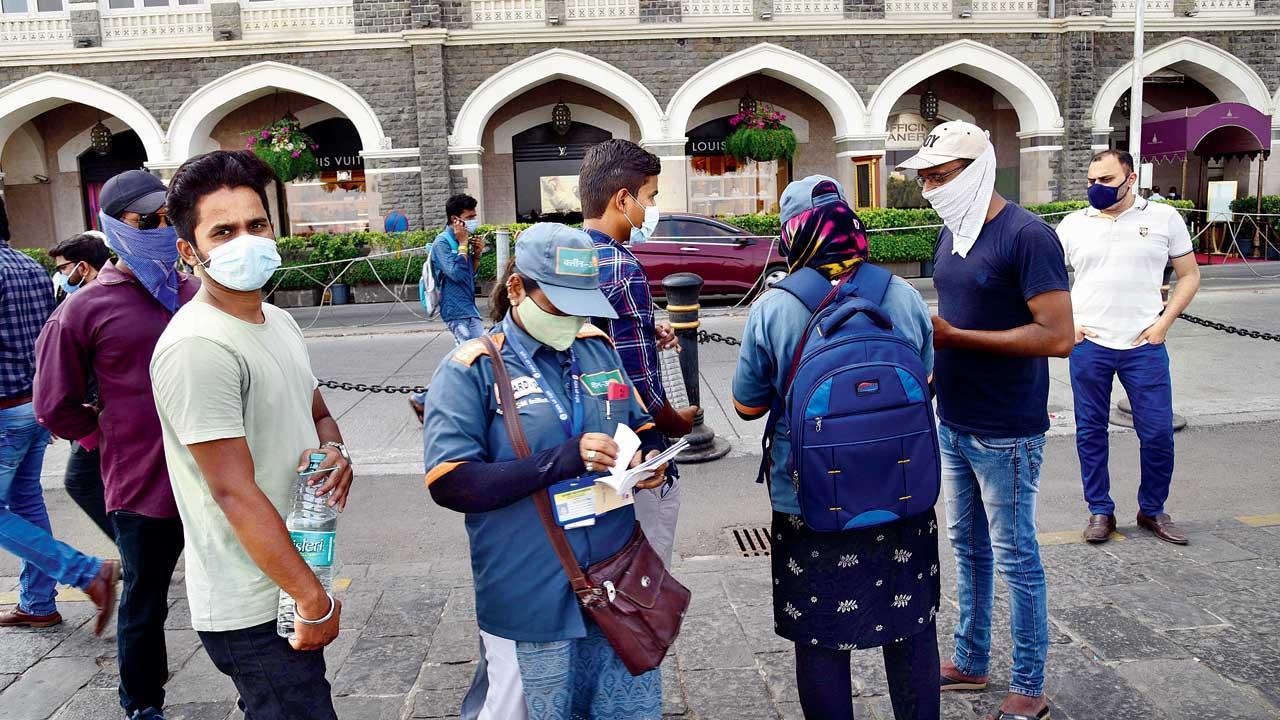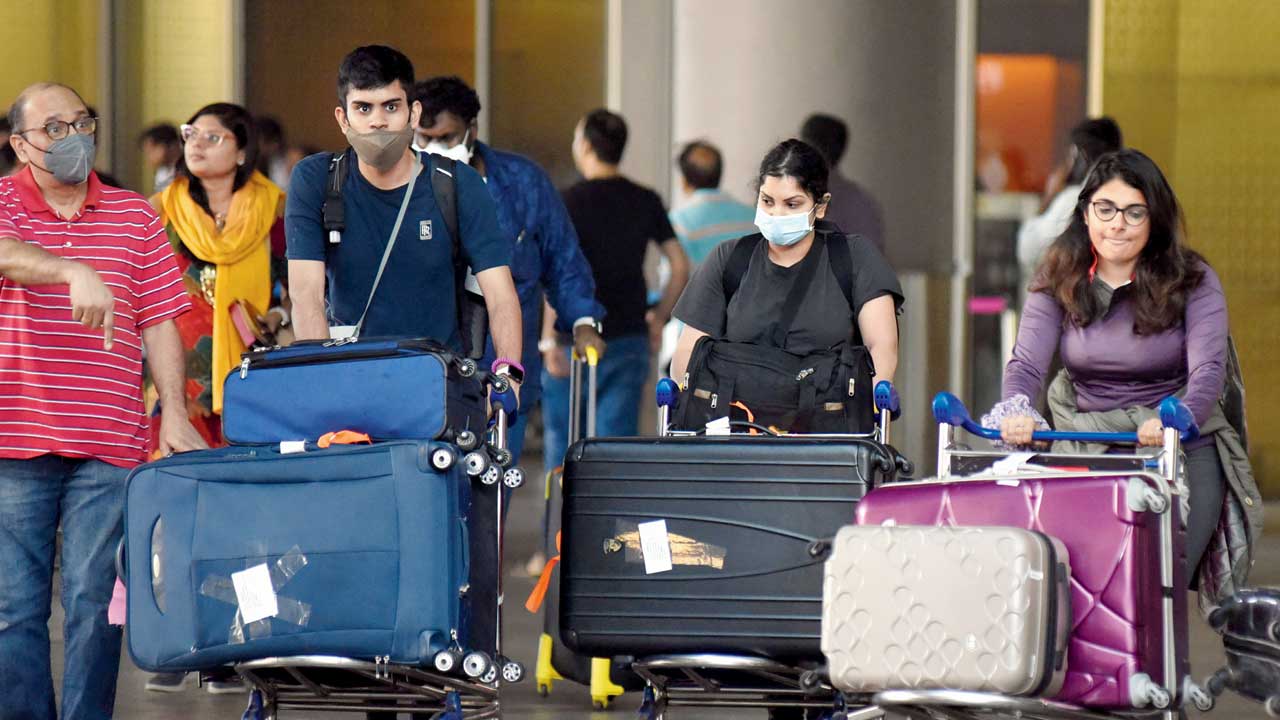Experts seek warning system for early emergence of recombinants during public celebrations

BMC marshals fine citizens for not wearing their masks correctly in Colaba, last year. Pic/Pradeep Dhivar
The new recombination of the SARS-CoV-2 variant Omicron (XBB 1.16) has triggered a concern once again, due to the steep increase in number of hospitalisations due to it across the country.
ADVERTISEMENT
Health experts warn that though most recombinations may not give rise to viable viruses. However, there is a possibility that a recombination could result in the creation of a new lineage of the virus with better functional capabilities than either of the parent lineages.
They say this calls for the government to institute dynamic genome sequencing and a warning system to look for early emergence of such recombinants during crowded public celebrations and events, which may be a reason for the present surge in cases.
Also Read: Mumbai: Health experts alarmed after respiratory viruses soar
 Doctors want you to mask up even when travelling. File pic/Sameer Markande
Doctors want you to mask up even when travelling. File pic/Sameer Markande
Dr Wiqar Shaikh, professor of medicine, Grant Medical College and Sir JJ Group of Hospitals, recalled a mid-day report titled ‘Should India be worried about the fourth wave’ on March 21, 2022. He said, if the present surge is not curtailed, then the probability of another wave cannot be ruled out.
He said that in India, there were 3,824 cases as of April 2, 2023 and five COVID-19 deaths. He said Maharashtra is the worst affected with 669 new cases on April 1. Dr Shaikh pointed out that as of March 28, 2023, the WHO said there were more than one lakh new COVID-19 cases worldwide and 636 deaths.
Dr Shaikh said the current surge in India is the result of uncontrolled processions all over the country. He said in India, almost 90 per cent of current cases were caused by the XBB.1.16 variant of Omicron. The remaining 10 per cent were caused by the XBB.1.15, BQ.1.1 and BQ.1 variants.
“SARS-CoV-2 continues to evolve by accumulating genetic variations. Not uncommonly, as also with other viruses such as the flu or HIV, a co-infection of multiple lineages of the virus in some people would result in recombination between genomes of two or more lineages. After SARS-CoV2 it ran out of variants such as alpha, beta, gamma, delta before reaching Omicron as a result of the global vaccine programme, recombinants of Omicron started to emerge by combining BA.2.10 and BA.2.75 in some hot-spot areas as XBB in China and Singapore in June 2022, and XBB.1.5 (also called ‘Kraken’) in New York in October 2022. Most of XBB.1.5 was controlled by booster vaccines in the United States,” said Dr Subhash Hira, professor of Global Health at University of Washington-Seattle and member of health core group of G-20.
Sequencing needed
Dr Hira said, “As India has gone through a crowded festive season without COVID etiquette in place (masks, sanitisation, physical distancing etc), a fast-spreading XBB.1 descendent of recombination with parent XBB from China/Singapore, generated the XBB.1.16 here and in few other South-east nations such as Brunei
and Singapore.”
“Although early clinical observations from several Indian states suggest that XBB.1.16 caused mild illnesses, and fewer hospitalisations among the elderly and those with underlying comorbidities, early immunologic workup suggested that most of these patients had not received the nasal booster vaccine. Applying the US experience with bivalent vaccine boosters given in October 2022 that stopped the spike of XBB.1.5, Indian vaccine companies are on track with multivalent nasal booster vaccines. This should be combined with compulsory use of masks in hospitals, in public places, on transport, and home care of elderly in society buildings that will help cut 40 per cent-60 per cent transmission,” Dr Hira suggested.
Reinfection with XBB
Dr Ketan Vagholkar, professor of surgery at DY Medical College, said, “XBB is currently the most antibody-evasive strain but it is not as lethal as the delta variant. Any person who was previously infected with an earlier Omicron variant continues to be susceptible to infection with XBB. The protection offered by booster doses is
debatable and hence not affirmatively advised.”
“The sudden surge of the XBB variant is mainly because of the change of environment. Whenever there is change in environment there will be a temporary surge in some COVID variants,” said Dr Santosh Bansode, emergency medicine specialist.
“It’s a possibility that some variant may exist in the environment but remain unnoticed. It may happen because of its mild nature. If any variant shows severe symptoms, then there is a high chance it will get detected in tests,” said Dr Bansode.
Prevention better than cure
Dr Shaikh said the worldwide mantra has been “prevention is better than cure”. This is a lesson not learnt by our governments or even the public. He said people have Thrown caution to the wind and stopped wearing masks, and hand sanitisers have long been discarded and rather unfortunately, processions and gatherings have been the norm all over the country.
“I urge the Indian government, the Maharashtra government and the BMC to impose the mask mandate, and urgently make hand sanitisation compulsory and impose a complete ban on processions, gatherings and rallies,” Dr Shaikh said.
636
Global COVID deaths as of Mar 28
 Subscribe today by clicking the link and stay updated with the latest news!" Click here!
Subscribe today by clicking the link and stay updated with the latest news!" Click here!







